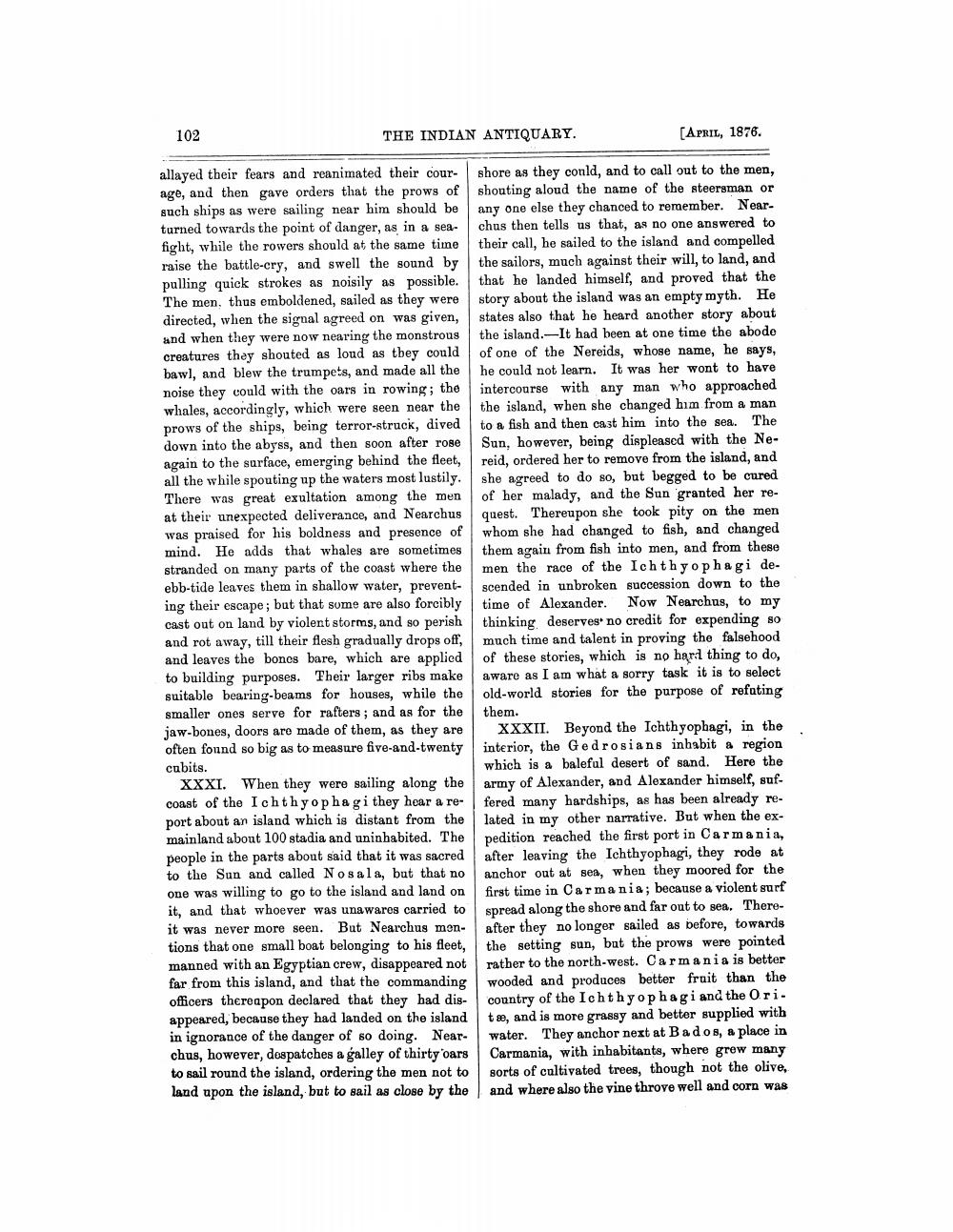________________
102
THE INDIAN ANTIQUARY.
[APRIL, 1876.
shore as they could, and to call out to the men, shouting aloud the name of the steersman or any one else they chanced to remember. Nearchus then tells us that, as no one answered to their call, he sailed to the island and compelled the sailors, much against their will, to land, and that he landed himself, and proved that the story about the island was an empty myth. He states also that he heard another story about the island.-It had been at one time the abode of one of the Nereids, whose name, he says, he could not learn. It was her wont to have intercourse with any man who approached the island, when she changed him from a man to a fish and then cast him into the sea. The Sun, however, being displeased with the Nereid, ordered her to remove from the island, and she agreed to do so, but begged to be cured of her malady, and the Sun granted her request. Thereupon she took pity on the men whom she had changed to fish, and changed them again from fish into men, and from these men the race of the Ichthyophagi descended in unbroken succession down to the time of Alexander. Now Nearchus, to my thinking deserves no credit for expending so much time and talent in proving the falsehood of these stories, which is no hard thing to do, aware as I am what a sorry task it is to select old-world stories for the purpose of refuting them.
allayed their fears and reanimated their courage, and then gave orders that the prows of such ships as were sailing near him should be turned towards the point of danger, as in a seafight, while the rowers should at the same time raise the battle-cry, and swell the sound by pulling quick strokes as noisily as possible. The men, thus emboldened, sailed as they were directed, when the signal agreed on was given, and when they were now nearing the monstrous creatures they shouted as loud as they could bawl, and blew the trumpets, and made all the noise they could with the oars in rowing; the whales, accordingly, which were seen near the prows of the ships, being terror-struck, dived down into the abyss, and then soon after rose again to the surface, emerging behind the fleet, all the while spouting up the waters most lustily. There was great exultation among the men at their unexpected deliverance, and Nearchus was praised for his boldness and presence of mind. He adds that whales are sometimes stranded on many parts of the coast where the ebb-tide leaves them in shallow water, preventing their escape; but that some are also forcibly cast out on land by violent storms, and so perish and rot away, till their flesh gradually drops off, and leaves the bones bare, which are applied to building purposes. Their larger ribs make suitable bearing-beams for houses, while the smaller ones serve for rafters; and as for the jaw-bones, doors are made of them, as they are often found so big as to measure five-and-twenty cubits.
XXXI. When they were sailing along the coast of the Ichthyophagi they hear a report about an island which is distant from the mainland about 100 stadia and uninhabited. The people in the parts about said that it was sacred to the Sun and called Nosala, but that no one was willing to go to the island and land on it, and that whoever was unawares carried to it was never more seen. But Nearchus mentions that one small boat belonging to his fleet, manned with an Egyptian crew, disappeared not far from this island, and that the commanding officers thereapon declared that they had disappeared, because they had landed on the island in ignorance of the danger of so doing. Nearchus, however, despatches a galley of thirty 'oars to sail round the island, ordering the men not to land upon the island, but to sail as close by the
XXXII. Beyond the Ichthyophagi, in the interior, the Gedrosians inhabit a region which is a baleful desert of sand. Here the army of Alexander, and Alexander himself, suffered many hardships, as has been already related in my other narrative. But when the expedition reached the first port in Carmania, after leaving the Ichthyophagi, they rode at anchor out at sea, when they moored for the first time in Carmania; because a violent surf spread along the shore and far out to sea. Thereafter they no longer sailed as before, towards the setting sun, but the prows were pointed rather to the north-west. Carmania is better wooded and produces better fruit than the country of the Ichthyophagi and the Ori. tee, and is more grassy and better supplied with water. They anchor next at Bados, a place in Carmania, with inhabitants, where grew many sorts of cultivated trees, though not the olive, and where also the vine throve well and corn was




